Sensor Sweep: Kyrik, Earl Norem, Stormbringer RPG, Denny O’Neill
Monday , 22, June 2020 Sensor Sweep 1 CommentT.V. (RMWC Reviews): In 1973, Tsuburaya Productions released several  shows as part of the company’s 10th anniversary. The first one to see release was Fireman (or Magma Man in some markets), which began airing on Nippon Television on January 7, 1973, running until July for 30 episodes.
shows as part of the company’s 10th anniversary. The first one to see release was Fireman (or Magma Man in some markets), which began airing on Nippon Television on January 7, 1973, running until July for 30 episodes.
Warfare (Aeoli Pera): The typical special forces trainee who passes selection has a higher rank (officers were far more likely to pass than enlisted), at least a bachelor’s degree, high general personality factor with extremely high conscientiousness, no children, and verbally tilted IQs averaging in the 120s. This study looks at Ranger school but it’s true across all special operations services in the Western world. Please note that, except for measuring the ability to do pullups, these exact predictors could be used to select head girls for graduate departments in the humanities and social sciences.
Fiction (Wasteland & Sky): Interested in superheroes? If you’re reading this post then there’s a good chance you do! But how much? Check out this new bundle of hero books compiled by immortal SF author Kevin J. Anderson. The offer is for a limited time, so don’t miss out! The description for the bundle is as follows: The Up, Up and Away Superheroes Bundle – Curated by Kevin J. Anderson: If reading is your kryptonite, I’ve put together a superpowered StoryBundle—thirteen books with marvelous heroes, supervillains, secret identities, mutant powers, and extraordinary gentlemen (and ladies).
Popular Culture (Legends of Men): Why do these guys virtue signal? 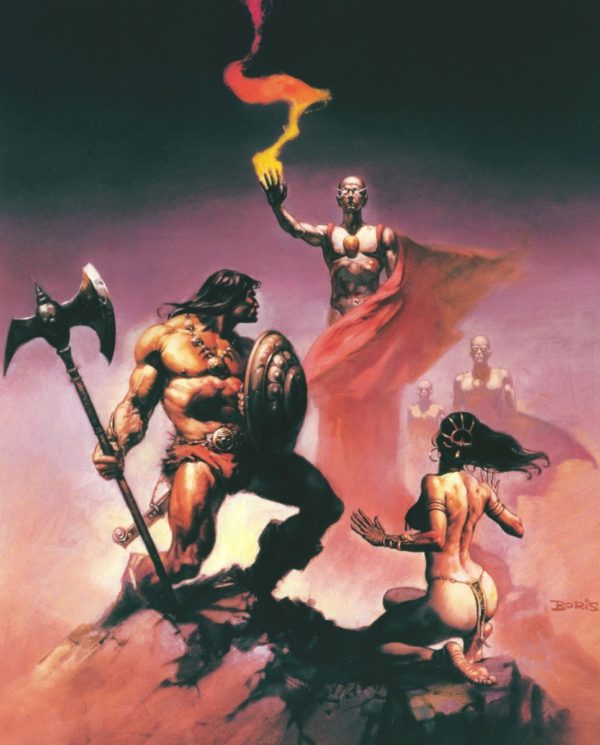 They’re saying this type of thing to other readers of S&S and REH and the pulps. The entire readership obviously enjoys these genres with as much or as little diversity as they already have. Past works cannot be changed and what made them popular once is more likely to make them popular again than changing the nature of what they are. So do some readers feel the need to virtue signal to other readers?
They’re saying this type of thing to other readers of S&S and REH and the pulps. The entire readership obviously enjoys these genres with as much or as little diversity as they already have. Past works cannot be changed and what made them popular once is more likely to make them popular again than changing the nature of what they are. So do some readers feel the need to virtue signal to other readers?
Reading (DVS Press): How many times have you seen a movie and though, “Man, the book was so much better,” or had a friend who read the book say the same to you? I can definitely say that the cases where the movie is better than the book are far outweighed by the reverse – probably in the range of 20:1. In fact, the only writer whose work seems to function better on screen than on paper is Stephen King, and even then there are plenty of books in his exceptionally large canon that are much better than their cinema counterpart (anyone remember The Dark Tower? I hope not).
Science Fiction (John C. Wright): Sometimes in this life we see justice done. The Nebula Awards have just honored Gene Wolfe with a Grandmastership. The honor is overdue, and all lovers of literature should rejoice. Gene Wolfe is the Luis Borges of North America. He is the greatest living author writing in the English language today, and I do not confine that remark to genre authors. I mean he is better than any mainstream authors at their best, better in the very aspects of the craft in which they take most pride.
Culture War (Kairos): This is why they hate Japan. This the material manifestation for why they can’t handle the Beautiful and seek to degrade before they destroy; the humiliation is intended as much to assuage the abuser’s amygdala as it is to afflict the victim’s, a “No You, Christcuck!” retort as they rip the beautiful apart before finishing the job. The cruelty is part of the process by design. The shitlords–God bless you all–at /pol/ noticed that this applies to all of the cultural attacks.
Art (DMR Books): When Earl demobilized, he went into magazine 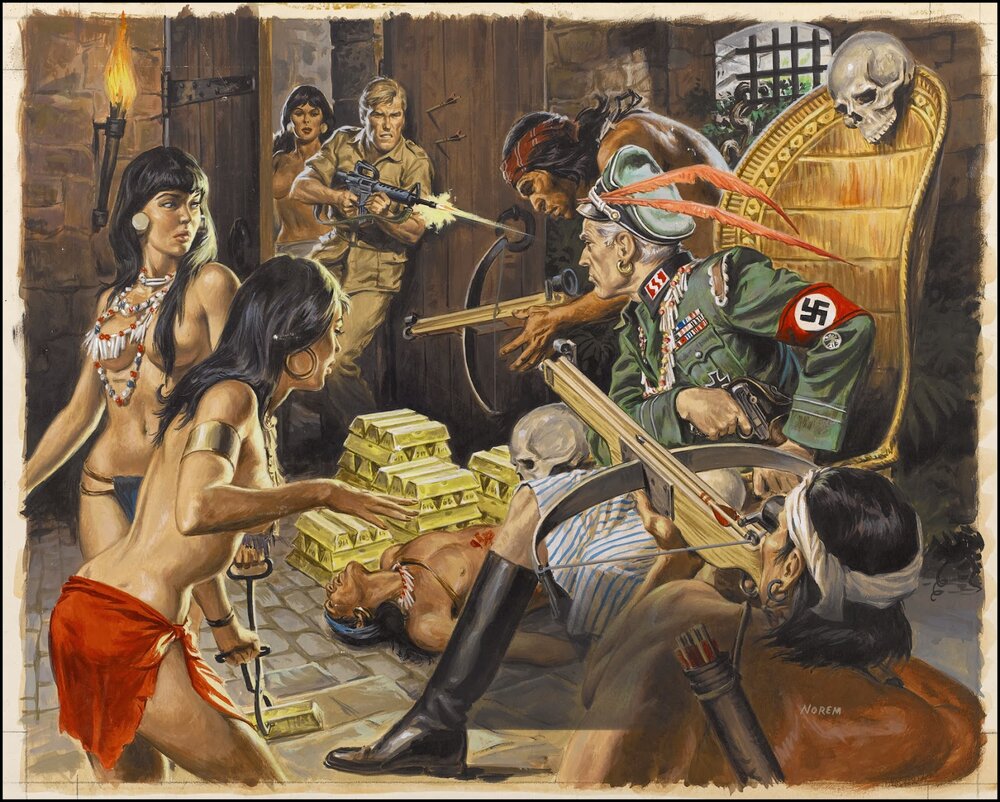 illustration, mostly for the “Men’s Adventure” mags. Such magazines have also been called “men’s pulps” and “sweat mags”. Essentially, they were magazines that somewhat carried on from the actual pulps–which died out in the 1950s–but were printed on “slick” paper. A significant percentage of their readers were veterans of World War Two and Korea who were looking for manly stories featuring action and beautiful women.
illustration, mostly for the “Men’s Adventure” mags. Such magazines have also been called “men’s pulps” and “sweat mags”. Essentially, they were magazines that somewhat carried on from the actual pulps–which died out in the 1950s–but were printed on “slick” paper. A significant percentage of their readers were veterans of World War Two and Korea who were looking for manly stories featuring action and beautiful women.
Comic Books (Diversions of the Groovy Kind): As most of you know, Groove-ophiles, Denny O’Neil, one of the most influential writers of the 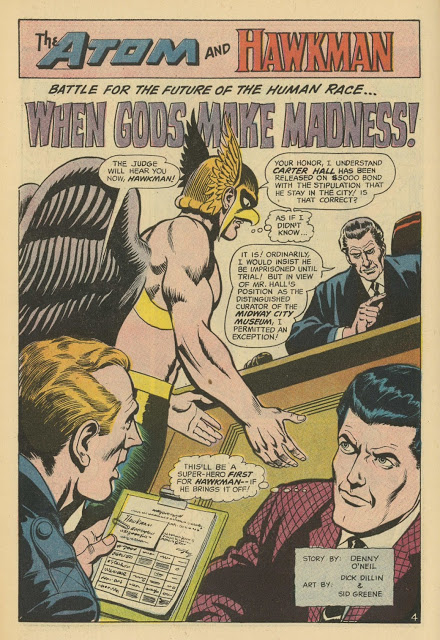 Groovy Age passed away at the age of 81 on Friday, June 12. Much has been written about O’Neil during the past week, and that’s how it should be. During the 1970s, O’Neil changed the way we would think about Batman in particular and comics in general forever (in tandem, naturally, with artist Neal Adams, mostly, but also with a host of other artistic luminaries from Irv Novick to Mike Kaluta to Jack Kirby to Mike Grell).
Groovy Age passed away at the age of 81 on Friday, June 12. Much has been written about O’Neil during the past week, and that’s how it should be. During the 1970s, O’Neil changed the way we would think about Batman in particular and comics in general forever (in tandem, naturally, with artist Neal Adams, mostly, but also with a host of other artistic luminaries from Irv Novick to Mike Kaluta to Jack Kirby to Mike Grell).
Robert E. Howard (Don Herron): Something I didn’t know much about, was a bank robbery that had occurred in the little town of Cisco on December 23, 1927, over 80 years earlier. The so-called Santa Claus Bank Robbery was a story I had heard about, of course, but the Kris Kringle business had conjured up images of a gang comprised of members of Monty Python’s Flying Circus and the Bowery Boys. I couldn’t have been more wrong.
RPG (Black Gate): Chaosium’s Stormbringer! was a licensed product based 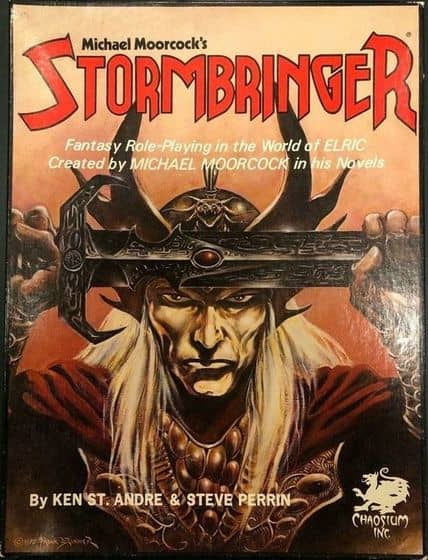 on Michael Moorcock’s Elric of Melniboné secondary world fantasy series. The game engine used modified Basic Roleplaying mechanics; in particular, magic worked very differently in Stormbringer than in Runequest. Characters could come from a wide variety of backgrounds; power-gamers preferred certain back-grounds over others because there was no pretense of game balance between them.
on Michael Moorcock’s Elric of Melniboné secondary world fantasy series. The game engine used modified Basic Roleplaying mechanics; in particular, magic worked very differently in Stormbringer than in Runequest. Characters could come from a wide variety of backgrounds; power-gamers preferred certain back-grounds over others because there was no pretense of game balance between them.
Heinlein (Black Gate): It’s almost impossible to discuss Robert A. Heinlein’s The Pursuit of the Pankera: A Parallel Novel about Parallel Universes 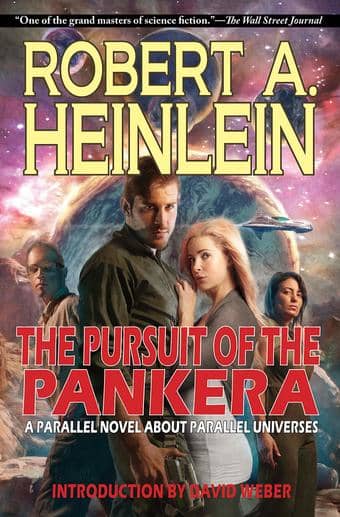 without revealing and thus spoiling the plot devices of it and its 1980 prequel/sequel, The Number of the Beast—. Heinlein, first Grand Master of the SFWA, for decades acclaimed as the Dean of sf, no longer pleases everyone. Some readers, especially academic critics, have denounced both books as grossly self-indulgent and even worthless. Others, like the brilliant Marxist professor H. Bruce Franklin (in his important 1980 study Robert A. Heinlein: America as Science Fiction) catch the feel of Beast: “a cotton-candy apocalypse — frothy, sweet, airy, mellow, light, festive, whimsical, insubstantial” (199).
without revealing and thus spoiling the plot devices of it and its 1980 prequel/sequel, The Number of the Beast—. Heinlein, first Grand Master of the SFWA, for decades acclaimed as the Dean of sf, no longer pleases everyone. Some readers, especially academic critics, have denounced both books as grossly self-indulgent and even worthless. Others, like the brilliant Marxist professor H. Bruce Franklin (in his important 1980 study Robert A. Heinlein: America as Science Fiction) catch the feel of Beast: “a cotton-candy apocalypse — frothy, sweet, airy, mellow, light, festive, whimsical, insubstantial” (199).
Sword-and-Sorcery (Ken Lizzi): I’ve read a few of Gardner Fox’s Kothar 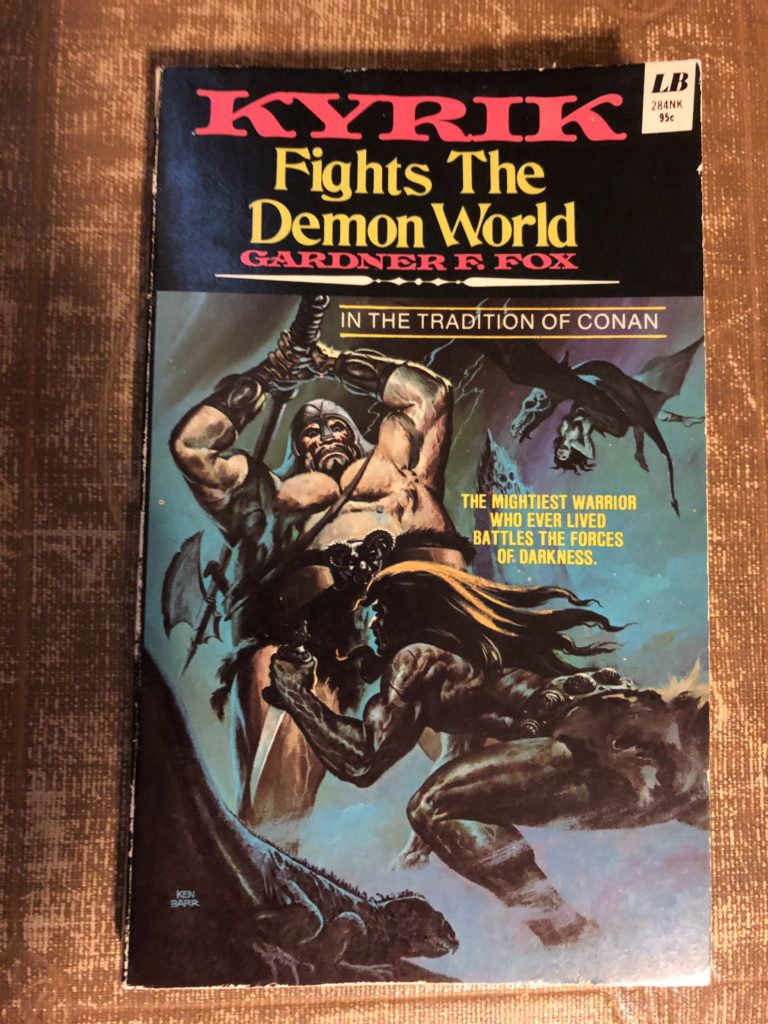 books. So when I saw his name on the cover of Kyrik Fights the Demon World I didn’t hesitate to snatch up the book. No one will claim that Fox was a master stylist. Take this paragraph from page one of Demon World. And so Makonnon quested through spatial emptiness into lands that had known him, long and long ago. He sent his mind across unfathomable distances, seeking, hunting, searching for that which so infuriated him.
books. So when I saw his name on the cover of Kyrik Fights the Demon World I didn’t hesitate to snatch up the book. No one will claim that Fox was a master stylist. Take this paragraph from page one of Demon World. And so Makonnon quested through spatial emptiness into lands that had known him, long and long ago. He sent his mind across unfathomable distances, seeking, hunting, searching for that which so infuriated him.
RPG (Cyborgs and Sorcerers): Vancian Freeform Magic. I know that sounds like a contradiction in terms. It isn’t. You’ll see. I love the idea of free-form 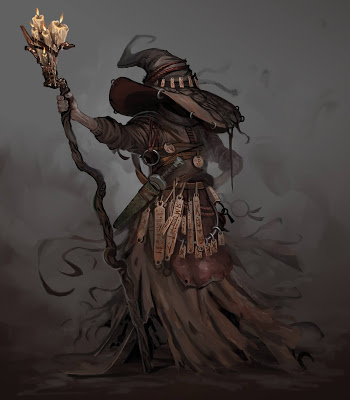 spell systems because they allow for endless creativity, and for me, creative problem-solving is the biggest source of fun in RPGs. In practice though, people often come up with a few favorite spells they cast over and over. This system was designed to prevent that by continually varying the tools in the free-form spellcaster’s toolbox. It’s a noun-verb system like Ars Magicka, except the nouns and verbs are not skills you’re permanently trained in.
spell systems because they allow for endless creativity, and for me, creative problem-solving is the biggest source of fun in RPGs. In practice though, people often come up with a few favorite spells they cast over and over. This system was designed to prevent that by continually varying the tools in the free-form spellcaster’s toolbox. It’s a noun-verb system like Ars Magicka, except the nouns and verbs are not skills you’re permanently trained in.
Tolkien (Tolkien and Fantasy): The details of Tolkien’s epistolary friendship 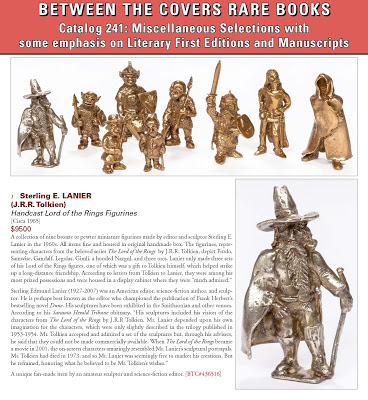 with the US editor, writer and sculptor Sterling Lanier (1927-2007) are difficult to ascertain, and various accounts differ as to the chronology and extent of their correspondence. In 1973, Lanier wrote that “it began in 1951” and amounted to some “dozen or so letters we exchanged over the years.” In a 1974 fanzine profile of Lanier by Piers Anthony, it notes that Lanier had had “ten years of correspondence” with Tolkien. In 2016, a book dealer had for sale six letters from Tolkien to Lanier, plus one from Tolkien’s wife.
with the US editor, writer and sculptor Sterling Lanier (1927-2007) are difficult to ascertain, and various accounts differ as to the chronology and extent of their correspondence. In 1973, Lanier wrote that “it began in 1951” and amounted to some “dozen or so letters we exchanged over the years.” In a 1974 fanzine profile of Lanier by Piers Anthony, it notes that Lanier had had “ten years of correspondence” with Tolkien. In 2016, a book dealer had for sale six letters from Tolkien to Lanier, plus one from Tolkien’s wife.
Science Fiction (M. Porcius): I enjoyed my recent look at the 1950 issue of 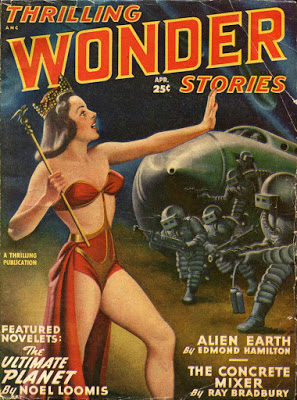 Thrilling Wonder Stories with Leigh Brackett’s “The Dancing Girl of Ganymede” and Henry Kuttner’s “The Voice of the Lobster,” so, to take a break from my rereading of Fafhrd and the Gray Mouser, I propose spending some time reading more stories by Brackett and Kuttner from Thrilling Wonder (we might end up checking out some Thrilling Wonder contributions by Brackett’s husband, Edmond Hamilton, as well.)
Thrilling Wonder Stories with Leigh Brackett’s “The Dancing Girl of Ganymede” and Henry Kuttner’s “The Voice of the Lobster,” so, to take a break from my rereading of Fafhrd and the Gray Mouser, I propose spending some time reading more stories by Brackett and Kuttner from Thrilling Wonder (we might end up checking out some Thrilling Wonder contributions by Brackett’s husband, Edmond Hamilton, as well.)
RPG (Swords and Stitchery): I have used & abused B4 The Lost City 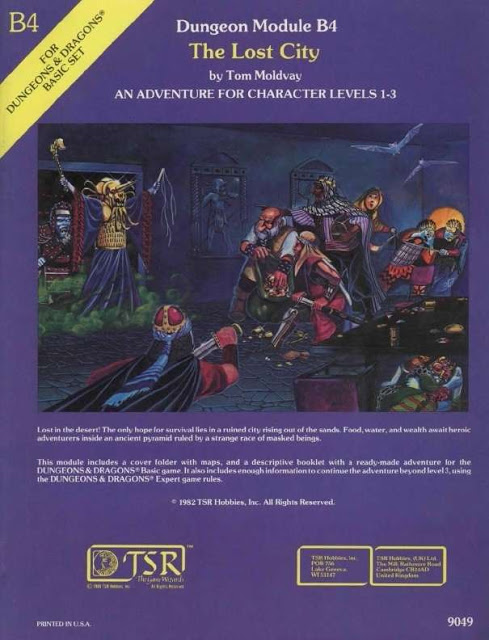 adventure & its inhabitants for years now a venerable pulp module created by Tom Moldvay. “”The Lost City” (1982) was the first adventure written entirely for the second edition Dungeons & Dragons Basic Set (1981). No surprise, then, that it was written by the author of that set, Tom Moldvay. ” Today I’ve been thinking about specifically adapting this module as perhaps a starter to Astonishing Swordsmen & Sorcerers of Hyperborea second edition as an introductory module.
adventure & its inhabitants for years now a venerable pulp module created by Tom Moldvay. “”The Lost City” (1982) was the first adventure written entirely for the second edition Dungeons & Dragons Basic Set (1981). No surprise, then, that it was written by the author of that set, Tom Moldvay. ” Today I’ve been thinking about specifically adapting this module as perhaps a starter to Astonishing Swordsmen & Sorcerers of Hyperborea second edition as an introductory module.
History (Outlook India): Tucked into Pakistan’s remote northwestern hills, along the border with Afghanistan, is a cluster of three villages whose residents are still trying to preserve their language and culture in the face of advancing modernity and religious conversion. The tribe, known as Kalash, is said to have descended from soldiers of the army of Alexander the Great who travelled this way in 324 BCE. However, many scholars deny the story even though it has not been established finally yet how these people, their language, dress, and their nature-worshipping culture—in marked contrast to the Islamic culture that surrounds them—evolved and survived through the centuries.
Fiction (Dark Worlds Quarterly): I used to use the words “Pulp-descended fiction” and it was the source of RAGE m a c h i n e Books. I wanted to capture that feeling that good Pulp writing gives you. What that really means is I grew up on authors who wrote during the Pulps and those who followed, they too influenced by those five decades of magazine publishing. The world has since moved on, with television and paperback novels, comic books (now called “graphic novels”). Despite this, Pulp remains with us. Not in the packaging but under the surface.
That’s a cool link on the Kalash. Always good to see Kipling and “The Man Who Would Be King” referenced.
Good post from DVS and a classic essay from John C. Wright. Keep ’em comin’!